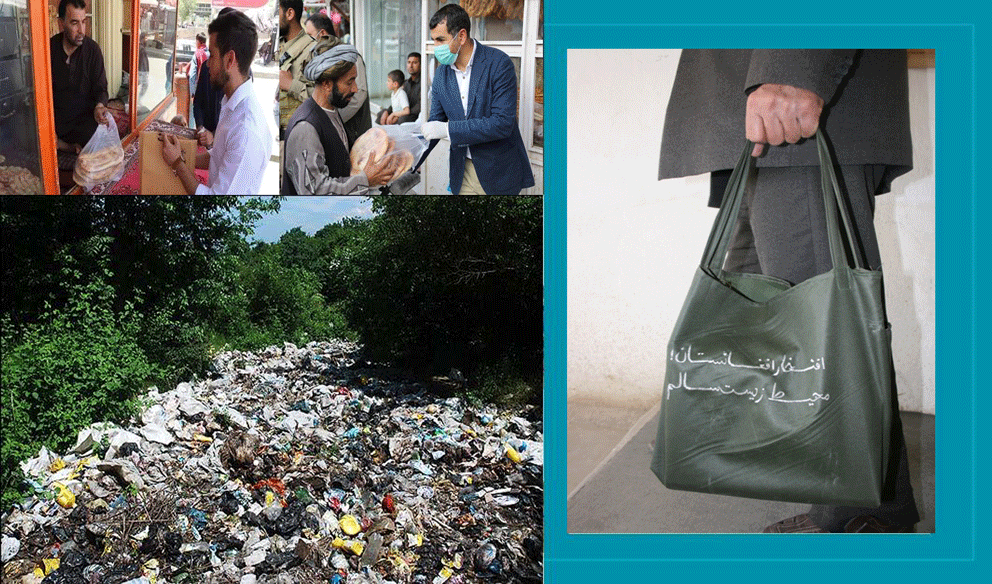KABUL (Pajhwok): The use of plastic bags is equally harmful for human health, agriculture and environment. Afghanistan needs to take its cue from the countries that have restricted the use of these bags.
Afghanistan also needs to substitute them with cloth or paper bags to curb the negative effects of poly bags, experts suggest.
The Finance Ministry banned the import of plastic bags in August 2023, but officials say such pokes are now produced domestically.
Avoid use of plastic bags for food
A doctor of internal medicine, Mujtaba Sofi, said four types of chemicals were used in making single-use dishes and plastic bags for their softness and shine. If used for hot food delivery, they can lead to sickness among humans.
According to Sofi, the use of plastic bags in this way can trigger nervous system disorders; degrade the immune system and cause headache and even cancer.
Sofi explained: “In the process of food delivery in poly pokes, the plastic may release phenol and phthalate chemicals, substances that can harm the consumer of such food.
:As the use of plastic bags is common in Afghanistan, where the incidence of cancer high. This can be caused by the use of plastic bags for hot food delivery.”
Black plastic bags, made by recycling plastic items, were dangerous, even if used once, he said. Sofi emphasised on eschewing the use of plastic bags, even for the delivery of tea or bread.
Sofi called for increasing the level of awareness about the dangers of plastic use: “It is the duty of the government to control the use of plastic gradually and bannig such bags in bakeries must be a priority.”
Industrialists should be encouraged to produce cloth bags instead of plastic ones, he suggested.
A doctor at the Wazir Mohammad Akbar Khan Hospital, Syed Farid Shah Rafiyee, has similar ideas about the use of plastic bags.
He said: “The use of polythene bags can be harmful, especially when used for carrying hot things, such as bread or other materials that contain acidic or alkaline compounds, like vinegar and pickle.”
The doctor added: “Plastic particles can be combined with food, When they enter the human body, such particles are injurious to health.”
He advised: “Everyone must try as much as they can not to use plastic bags for carrying food items, especially hot food like bread. Everyone should use paper or tote bags.”
He stressed the need for a high level of awareness among the people about the harm of plastic bags. If the awareness level is not high enough, it will not be possible to prevent the use of such bags.
Rafiyee views paper/tote bags are a better substitutes to plastic ones. The private sector be motivated to produce paper and cloth bags.
Oncologist Dr. Ahmad Javed Zarang said a chemical item ‘Base Phenol E’ is used in the production of plastic. Mixed with food, it causes health problems.
The long-term use of plastic dishes for food also led to different ailments such as respiratory and cardiac complications, as well as cancer, he explained.
The oncologist said: “The use of plastic bags is banned in most countries around the world, because they cause illnesses and aren’t biodegradable.
“Most of plastics are produced from molecules of polythene, which remain unchanged for hundreds of years. Almost all countries use paper and cloth bags instead of plastic ones, which are easily biodegradable and don’t contribute to the pollution of water, air and environment.”
Dr.Zarang also emphasised on promoting public awareness. He said the best alternative to plastic bags was cloth and paper bags.
He claimed: “The factories producing plastic bags can also manufacture the paper and cloth variety, which does not damage the economy of the country, but prevents pollution and diseases.”
“The plastic bags even damage the quality of soil and water resources.” The doctor continued.
Agriculturists believe plastic waste thrown or buried in places which spawns pollution, reaching the roots of plants. In some cases, they say, plants go dry as well.
Experts say plastics, even if buried, are not decomposed for years. If animals are taken to such places for grazing, they would remain unsafe from the dangers of plastic waste.
Environmentalist Eng. Syed Qayyum Hashimi also said plastic bags had a dangerous impact on the environment.
He said: “The plastic particles due to their sustainability can remain unchanged for hundreds of years, contributing to more dangerous things, including carbon-dioxide and methane greenhouse gases. Plastics can pollute water resources, air and soil.”
He called for an increased level of awareness among the people, who should be advised to avoid the use of plastic bags.
National Environment Protection Authority’s (NEPA) official Eng. Toofan Jibran said: “Unfortunately, the use of plastic is so widespread in Afghanistan for grocery, delivery, covering clothes from dust, covering the windows, roofs floors, stairs, shops and so on.
“If plastic is used for a long time in such a manner, its particles can remain intact for centuries,” the NEPA official maintained.
According to his estimate, about four tonnes of plastic is used daily only in the capital city of Kabul.
Toofan said one of the reasons for the excessive use of plastic was its low price and lack of awareness about its social, economic, health and environmental hazards.
He said: “NEPA, Kabul Municipality and the Ministry of Public Health (MoPH) have launched a joint campaign to replace plastic bags with cloth bags and ban imports of plastic bags.”
Simultaneously, the private sector is being encouraged with cooperation from the Ministry of Commerce and Industry to recycle used plastic, he concluded.
aw/mud







GET IN TOUCH
NEWSLETTER
SUGGEST A STORY
PAJHWOK MOBILE APP